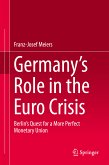This book uses comparative economic analysis to provide a common conceptual framework for all current European Union member states. Based on empirical investigation, the author identifies the Nordic, North-western, Mediterranean, and Central and Eastern models of capitalism on the threshold of the 2008 global financial and economic crisis. The chapters also examine the resulting institutional responses to the crisis and the methods of crisis management adopted by each member state. The analysis reveals that the crisis has not triggered radical institutional change but, instead, highlighted deep institutional differences not between the old and new member states, but between the Nordic, North-western, Mediterranean, and Central and Eastern European countries. These institutional differences are so significant that they require the rethinking of European integration theory.
Models of Capitalism in the European Union serves as a useful handbook for academics, advanced students, policy-makers and advisors who are interested in European economic issues.
Dieser Download kann aus rechtlichen Gründen nur mit Rechnungsadresse in A, B, BG, CY, CZ, D, DK, EW, E, FIN, F, GR, HR, H, IRL, I, LT, L, LR, M, NL, PL, P, R, S, SLO, SK ausgeliefert werden.









